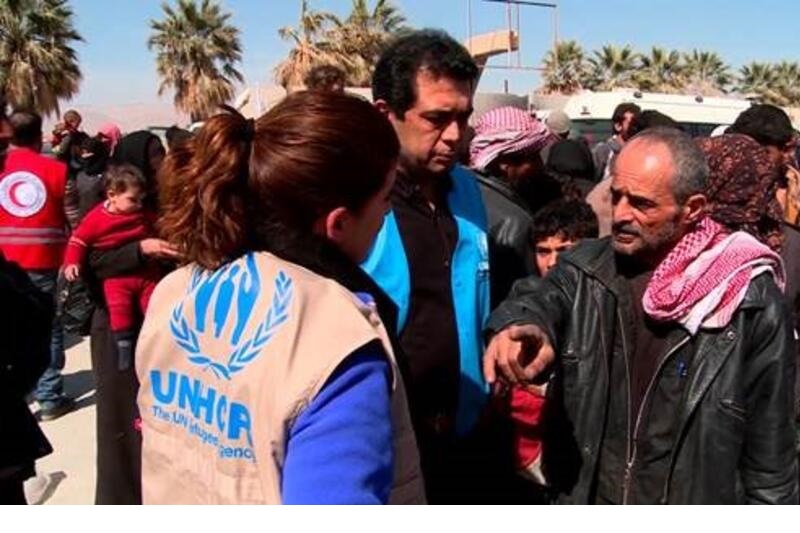

middle east refugees in desperate and dire conditions, urgency to tackle root causes
In recent years, the Middle East has been riddled with a deepening refugee crisis as millions of people from neighboring countries flee their homes to escape political conflict, persecution and economic stability. As of late, the Sudan crisis has triggered a fresh wave of refugees into the Middle East.
The United Nations High Commissioner for Refugees (UNHCR) says nearly a million people have been displaced, the internally displaced about 730,000 – 220,000 have fled to neighboring countries of Egypt, Chad, Ethiopia and the Central African Republic. The agency highlighted that South Sudanese make up the largest number of refugees and asylum seekers.
Raouf Mazou, UNHCR’s Assistant High Commissioner for Operations, said the ongoing conflict has caused massive outflows into neighboring countries. More people were forced to leave when the conflict in Sudan intensified on June 3. Reports state civilians have been facing the brunt, including deaths and sexual violence.
Another Humanitarian Crisis
The conflict in Sudan, between the Sudanese Armed Forces (SAF) and the Rapid Support Forces (RSF), has forced over 1.4 Million people to leave their homes. Majority of those displaced are small children and women. Egyptian authorities, according to Frontline Defenders, received over 170,000 Sudanese refugees, mainly from Khartoum, in the last 50 days. Reports say women refugees have to overcome the RSF and SAF checkpoints on the roads, blockage and looting. However, many more women are stuck and stranded in regions of conflict as they fear traveling.
They have no means to meet the high transportation costs. Moreover, reported incidents of sexual harassment on the roads have prompted many young girls and women to remain in the dangerous areas. The UN Office of High Commissioner for Human Rights (OHCHR) said there are reports of civilians being killed in markets or their houses – 10 Congolese refugees were killed early this month during an attack in the area they were living in.
Strain on Host Countries
Ongoing conflicts in Syria and Yemen over the years have driven millions of individuals and families to seek safety and shelter in neighboring countries. Turkey, Iraq, Jordan and Lebanon have had to host thousands of refugees, straining their resources and infrastructure to the limit. These host countries have been overwhelmed by the sheer scale of the crisis. As such, refugees have been left in dire conditions with limited access to basic necessities, like food, water and healthcare.
Adequate housing is one of the major challenges faced by the refugees in the Middle East. They have no alternative but to stay in overcrowded camps, makeshift settlements and live in unsanitary conditions where they are at the risk of disease outbreaks. The living conditions are deplorable – families have to live in cramped tents, exposed to extreme weather conditions, lack of privacy and security.
Another pressing issue is mental health. The trauma endured by these displaced people, who have witnessed and experienced violence, hits their mental wellbeing. Refugees have to cope with their experiences on their own and rebuild their lives.
Focus on Root Causes
Wars and internal conflicts are the biggest cause of displacement of people and the making of refugees. A concerted effort is needed to bring an end to these root causes. The respective governments and world bodies have to seek diplomatic solutions. Internal pressure should be put on parties in order to engage them in peaceful negotiations and find political settlements and solutions. Furthermore, there must be a renewed commitment to providing humanitarian aid and support to the host countries.
The international community should do its bit by providing financial assistance and resources to help alleviate the burden on countries hosting hundreds of thousands of refugees. Support has to be reinforced into improving living conditions, healthcare and education. The affected regions can be uplifted through economic development and job opportunities. But all is only possible through a comprehensive and coordinated approach.
It requires collective efforts of governments, international organizations and the civil society to address the root causes of the crisis, and provide immediate assistance and support to the refugees.
Former President Donald Trump is taking legal action to strike down one of the topics on the forgotten list of…
As U.S. retailers like Walmart and Costco pursue alternatives to Chinese and Bangladeshi suppliers due to rising tariffs, India's garment…
U.S. worker productivity declined for the first time in almost three years in the first quarter of 2025, in a…
According to the Ministry of Health, Labour and Welfare in March 2025, Japan's inflation adjusted real wages fell by 2.1%…
BluSmart Mobility, once viewed as India’s green ride-hailing alternative, ceased operations in April 2025 leaving nearly 10,000 drivers unemployed without…
The India-UK Free Trade Agreement (FTA), recently learnt, has attracted some attention for one of its benefits enabling Indian workers…
This website uses cookies.
Read More